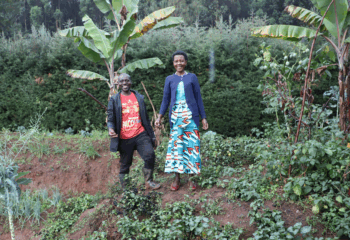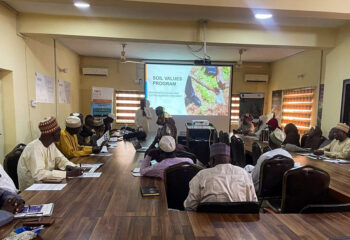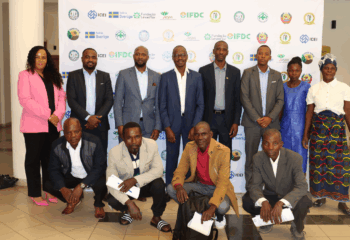
At IFDC, we’re all passionate about soil, especially our scientists. In honor of World Soil Day, we discussed how soil health contributes to improved food systems and livelihoods with two of our scientists, Job Fugice and Quintar Genga. Fugice is a Research Scientist and Manager of Laboratory Services at IFDC Headquarters. Genga serves as a Soil Fertility Specialist for IFDC in Kenya.
Why is it important for societies to address soil health and plant nutrition for improved food systems?
Job Fugice. As we know, soil is one of the most important factors for our survival in terms of food security. A sustainable agricultural system starts with a healthy soil. A soil’s health is contingent upon the mix of living organisms it contains, including bacteria, fungi, protozoa, insects, worms, other invertebrates, and vertebrates. This diverse range of organisms interacts to provide a wide variety of ecosystem services. Healthy soils thrive on these microscopic life forms; they are essential for plant growth and protection from disease. Healthy soils directly supply adequate essential plant nutrients for increased productivity, resulting in a sufficient nutritious food supply. Soil degradation threatens not only the ecosystem, but also our ability to produce healthy food. Protecting and reviving our soils is important for humans as well as the plant and animal species that depend on them.
Quintar Genga. Soil is the most important natural resource as far as agriculture is concerned. Soil health is determined by its properties, which include texture, depth, infiltration, bulk density, water-holding capacity, organic matter, pH, electrical conductivity, microbial biomass, carbon and nitrogen balance, mineralizable nitrogen, and respiration. These soil properties are maintained or enhanced by continually observing good farming practices. Plant nutrition involves supplying the chemical elements and compounds necessary for plant growth, plant metabolism, and their external supply.
Addressing soil health and plant nutrition will ensure improved yields and crop quality, which directly affect human and animal nutrition and food security. In most developed and developing countries, micronutrient deficiency in crops and pastures is widespread, with negative consequences for both animal and human health.
Even with improved crop quality and quantity, sustainable food production is essential for food security. Adopting practices that improve soil health and plant nutrition while maintaining environmental health will increase economic profitability in the long run.
How can research provide sustainable soil fertility-related solutions for improving livelihoods?
JF. From the beginning, when people only used organic materials, through the revolution of the Haber-Bosch process, soil fertility has benefited from extensive research. Providing sustainable solutions starts with the development of products from raw materials that are more efficient. By using less fertilizer more effectively, we can supply essential plant nutrients to the soil without harmful effects to the environment. Research for the development of smart fertilizers that are climate-responsive, enhance climate resilience, require one-time application, have high N use efficiency, and reduce reactive nitrogen and phosphorus additions to the environment is a critical soil fertility solution for improving livelihoods. Research can ensure the development of fertilizers that utilize the soil’s ecosystem services to continue increasing food production, while reducing environmental pollution and improving fertilizer management to achieve synchrony between nutrient supply and crop demand. This will ensure sustainable improvement in crop productivity.
QG. Through a farmer participatory research, we can provide evidence-based processes and methodologies for prioritizing recommendations. These findings are useful for establishing an action plan for future investments and strategies. Adopting farm practices that have been proven to work and incorporating those with new enhanced technologies will ensure practicality and sustainability of solutions that improve the production and profitability of farming systems.
What renewed commitments to soil health and plant nutrition would you like to see made internationally?
JF. I would like to see improvements in nutrient efficiency that recognize the need to maintain soil health at the highest level possible. We have heard much about different products and technologies that increase yields, but we do not often hear about post-harvest soil conditions, which is where soil health comes into play. The most important quality of these commitments is that they must benefit farmers. Farmers need materials that are scientifically proven to help the soil. Efforts to develop and approve new products that can help the soil at a fair cost, which will allow them to find success in markets, should be amplified. Economical support for agricultural companies and farmers is the way to success.
QG. Though very straightforward, the 4R principles remain the foundation to achieving food security, sustainability, and economic profitability. Optimized use of the Right mineral fertilizers at the Right rate, at the Right time, and in the Right place, in combination with organic amendments, should be widely disseminated and practiced. In addition, policies that protect soil and water resources must be implemented hand in hand with the 4R principles.



